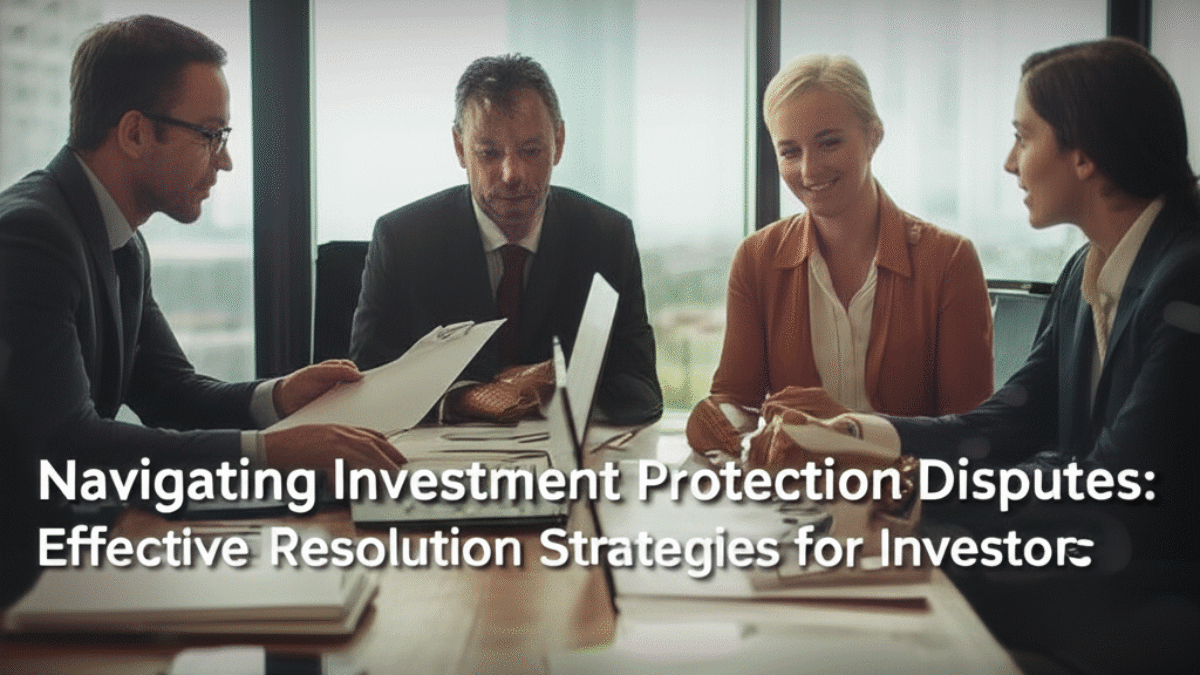Navigating Investment Protection Disputes: Effective Resolution Strategies for Investors
Imagine you’re an investor who has put your hard-earned money into a promising venture, only to find yourself in the midst of a dispute over whether your investment was protected. It’s a daunting scenario, and many investors find themselves in similar positions. Investment protection disputes can arise from various situations—ranging from contract breaches to regulatory issues. As someone who has navigated these murky waters, I can tell you that understanding how to effectively resolve these disputes is crucial for safeguarding your financial interests.
In this article, we’ll explore the landscape of investment protection disputes, highlighting the key components that contribute to effective resolution strategies. Whether you’re an experienced investor or just starting, you’ll gain valuable insights into the complexities of these disputes and learn actionable steps you can take to protect your investments. From understanding the legal frameworks that govern investments to exploring alternative dispute resolution methods, we’ll cover it all. So, let’s dive in!
Understanding Investment Protection Disputes
Investment protection disputes arise when there is a conflict regarding the rights and obligations of parties involved in investment transactions. These disputes can stem from various sources, including:
- Contractual Issues: Breaches of contract can lead to disagreements over terms, conditions, and obligations.
- Regulatory Compliance: Non-compliance with laws and regulations can result in legal disputes.
- Fraud or Misrepresentation: Investors may find themselves at a disadvantage if they were misled about the nature of an investment.
- Market Fluctuations: Changes in market conditions can impact the value of investments, leading to disputes over losses.
Understanding these sources of conflict is the first step in navigating investment protection disputes. By recognizing potential pitfalls, you can better prepare yourself to address them should they arise.
Key Components of Effective Resolution Strategies
When faced with an investment protection dispute, having an effective resolution strategy can make a significant difference. Here are some key components to consider:
1. Clear Communication
Open lines of communication are vital. Engaging in dialogue with the other party can often lead to a quicker resolution. You might be surprised how many disputes can be resolved simply by discussing the issues at hand. Here are some tips for effective communication:
- Be Transparent: Share your concerns honestly and openly.
- Listen Actively: Understand the other party’s perspective to find common ground.
- Avoid Emotions: Stay calm and focused on the facts rather than letting emotions dictate the conversation.
2. Documentation
Having thorough documentation is crucial in any investment protection dispute. This includes contracts, emails, meeting notes, and any other relevant communications. Proper documentation not only supports your claims but also helps to clarify misunderstandings.
3. Know Your Rights
Understanding your legal rights as an investor is essential. This includes being aware of the laws and regulations that protect your investments. Researching local and international laws can empower you and help inform your strategy. Consulting with a legal expert can also provide clarity on your rights and obligations.
4. Alternative Dispute Resolution (ADR)
Many investors overlook the benefits of alternative dispute resolution methods, such as mediation and arbitration. ADR can often be a faster and less costly way to resolve disputes compared to traditional litigation. Here’s how they work:
- Mediation: A neutral third party facilitates a discussion between the disputing parties to find a mutually acceptable solution.
- Arbitration: A neutral arbitrator makes a binding decision based on the evidence presented.
Both methods can save time and resources while still providing a fair outcome.
5. Legal Action
In some cases, legal action may be unavoidable. If negotiations and ADR fail, pursuing litigation may be necessary to protect your interests. However, this should be seen as a last resort due to the costs and time involved. Before proceeding, ensure that you:
- Consult a Lawyer: Seek legal advice to understand your options and the potential outcomes.
- Evaluate Costs: Consider the financial implications of a lawsuit against the potential recovery.
Benefits and Importance of Effective Resolution Strategies
So why is it crucial to have a well-thought-out resolution strategy for investment protection disputes? Here are some compelling reasons:
1. Preserves Relationships
Effective resolution strategies, especially those that involve communication and mediation, can help preserve professional relationships. This is particularly important in industries where you may have ongoing partnerships or future opportunities with the other party.
2. Reduces Costs
Addressing disputes early and effectively can save both parties significant legal costs. Litigation can be expensive and time-consuming, whereas negotiation and mediation are often more cost-effective options.
3. Provides Peace of Mind
Knowing that you have a clear strategy for resolving disputes can provide peace of mind. This reassurance allows you to focus on your investments and business operations rather than being preoccupied with potential conflicts.
4. Enhances Reputation
How you handle disputes can impact your reputation as an investor. By resolving conflicts professionally and ethically, you can enhance your standing in the industry, making it easier to attract new opportunities.
Practical Applications of Resolution Strategies
Now that we’ve discussed the components and benefits of effective resolution strategies, let’s look at some practical applications through real-world examples.
Case Study 1: Mediation in Action
Consider a scenario where two investors, Alice and Bob, co-invest in a startup. After a year, they disagree over the management decisions made by one party. Rather than escalating the dispute, they agree to mediation. A neutral mediator helps them articulate their concerns and explore potential compromises. Through mediation, they agree on a new management structure that satisfies both parties, preserving their investment and relationship.
Case Study 2: The Importance of Documentation
In another situation, Sarah invests in a technology firm but later discovers that the company misrepresented its financial status. Sarah had kept detailed records of all communications, including emails and contracts. When she decides to take legal action, her thorough documentation supports her claims, leading to a favorable settlement without lengthy litigation.
Frequently Asked Questions
What is an investment protection dispute?
An investment protection dispute occurs when there is a disagreement between parties regarding the terms, obligations, or rights related to an investment transaction. Common causes include contract breaches, regulatory issues, or misrepresentation of information.
How can I avoid investment protection disputes?
While it’s impossible to eliminate all disputes, you can minimize risks by conducting thorough due diligence before investing, ensuring clear and transparent communication with partners, and maintaining comprehensive documentation of all agreements and interactions.
What are the benefits of alternative dispute resolution?
Alternative dispute resolution (ADR), such as mediation and arbitration, offers several benefits, including reduced costs, faster resolutions, and the preservation of relationships. ADR can often lead to mutually satisfactory outcomes without the need for lengthy court battles.
When should I consider legal action?
Legal action should be considered when all other options, including negotiation and ADR, fail to resolve the dispute satisfactorily. It’s important to consult with a legal expert to evaluate the potential costs and benefits before proceeding.
How can I prepare for a dispute resolution process?
Preparing for a dispute resolution process involves gathering all relevant documentation, understanding your rights, and considering your goals for the resolution. Engaging a legal or mediation expert can also help you formulate a strategic approach.
What role does communication play in resolving disputes?
Effective communication is crucial in resolving disputes. Open, honest dialogue can help clarify misunderstandings, identify shared interests, and facilitate a more amicable resolution. Active listening and a willingness to compromise are key factors in this process.
Conclusion
Navigating investment protection disputes can be challenging, but with the right strategies, you can effectively protect your interests and resolve conflicts. By prioritizing clear communication, thorough documentation, and understanding your rights, you set the stage for successful dispute resolution. Remember, alternative dispute resolution methods can offer a faster and more cost-effective means of resolving disagreements, and knowing when to escalate to legal action is crucial.
As you move forward in your investment journey, keep these strategies in mind. By taking proactive steps to prepare for potential disputes, you can safeguard your investments and maintain your peace of mind. Your next investment opportunity awaits—don’t let disputes hold you back!


